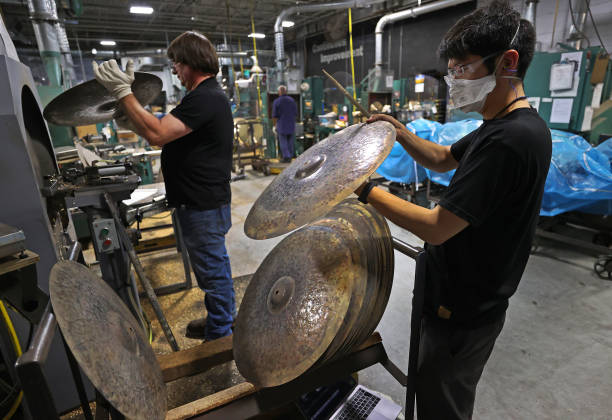Whether you’re rehearsing indoors or performing outdoors, Cymbal care is essential. Skin oils, sweat, and environmental grime can settle into the grooves, dulling their shine and performance over time. Make it a habit to clean your cymbals after every rehearsal. Neglecting this simple routine can lead to permanent tarnishing, making it harder to restore their brilliant appearance and extending cymbal life—an important aspect of a visually striking performance ensemble. This article has an answer to the question, “How to maintain cymbals?”

The Ultimate Cymbal Care & Maintenance Guide: Protect, Perfect, Perform
Cymbals are the shimmering crown jewels of any drum set, capable of transforming the soundscape of your performance. While built to withstand powerful strikes, they’re far from indestructible. Regular care and preventative maintenance are essential to keeping them looking pristine and sounding crisp. In this guide, we’ll dive into the tips, techniques, and tricks to help you prolong the life of your cymbals and get the most out of them.
Love Your Cymbals: Why Maintenance Matters for Cymbal Care
Cymbals are an integral part of your drum setup, yet they’re often overlooked when it comes to regular care. Neglecting them can lead to visible damage like cracks, keyholing, or oxidation—all of which can negatively impact sound quality. The cost of replacing a broken cymbal can make your wallet cry, so a little maintenance now goes a long way later. Think of this as showing your cymbals some love; after all, they’re your partners in rhythm.
Mounting Matters: The Right Start for Cymbal Care
How you mount your cymbals directly affects their longevity. Incorrect mounting can lead to cracks, poor resonance, and even warranty voiding.
A. Cymbal Sleeves & Felts Are Non-Negotiable
Before placing a cymbal on its stand, ensure there’s a protective plastic or rubber cymbal sleeve and felt washers in place. This prevents metal-on-metal contact, which can degrade the center hole and lead to keyholing—a cymbal’s worst nightmare.
B. Don’t Squeeze the Life Out of Your Cymbals
Overtightening the wingnut may seem harmless, but it stifles your cymbal’s resonance and can cause spiderweb cracks near the bell. Your cymbals should swing freely when struck, absorbing the energy of your strikes naturally.
C. Adjust the Angle for Optimal Hits
Positioning your cymbals too flat can increase the stress on their edges. To prevent cracks, angle your cymbals slightly toward you, especially if they’re mounted above eye level. This ensures a cleaner, safer strike every time.
Strike Gold: The Art of Proper Technique for Cymbal Care
No matter how strong or durable a cymbal is, poor striking technique can spell disaster.
A. Swing Smarter, Not Harder
Avoid hitting your cymbal with the full force of a battle axe. While it might look cool, it’s a surefire way to damage the edges. Instead, use a glancing blow—strike the cymbal at an angle, allowing the stick to bounce off naturally. This not only protects your cymbal but also enhances its sound projection.
B. Let Them Breathe
Cymbals are designed to resonate. Hitting too hard, too frequently, or in the same spot can dampen their sound over time. Mix up your playing dynamics to keep your cymbals alive and singing.
Shine On: How to Clean Your Cymbals
A dirty cymbal not only looks dull but can also sound muted. The Cymbal cleaning tips will greatly help in keeping them well. Oils from your hands, sweat, and dust can build up, especially in the grooves. Regular cleaning keeps your cymbals shiny and sonically crisp.
A. Basic Cleaning Routine
- Use a dry, soft cloth to wipe down your cymbals after each use.
- For a deeper clean, use a mild soap-and-water solution with a non-abrasive sponge to remove grime.
B. Tackle Tarnish with Cymbal Polish
Invest in a cymbal-specific polish for stubborn stains or tarnishing. Apply sparingly, following the grooves, and avoid polishing over logos unless you want them to fade.
C. Hands Off!
Minimize handling your cymbals with bare hands. Use gloves or handle them by the edges to reduce oil transfer.
Pack Smart: Storing and Transporting Cymbals
Storing your cymbals properly is just as important as cleaning them. Improper storage can lead to warping, bending, or even corrosion over time.
A. Always Use a Cymbal Bag or Case
Invest in a padded cymbal bag or hard case. Not only does it make transportation easier, but it also protects your cymbals from scratches and impacts during storage.
B. Lay Flat, Not on Edge
When temporarily setting your cymbals down, always lay them flat. Storing them on their edge can bend or chip the rims over time.
C. Keep Them Dry and Cool
Humidity is your cymbals’ worst enemy. Prolonged exposure to moisture can cause oxidation and rust. Store your cymbals in a dry environment, away from temperature extremes.
Watch for Warning Signs: Early Damage Detection
Regularly inspect your cymbals for cracks, dents, or signs of keyholing. Addressing minor issues early can prevent further damage. For example, a small edge crack can sometimes be filed down to stop it from spreading.
Quick Tips for Cymbal Longevity
- Rotate your cymbals occasionally on the stand to distribute wear evenly.
- Use proper sticks with nylon tips for less abrasive strikes.
- Avoid stacking cymbals without separators in between.
Beyond Maintenance: Treat Your Cymbals Like an Instrument
Your cymbals are more than just gear—they’re instruments with a unique voice. Taking care of them ensures they continue to produce the rich, vibrant sounds you fell in love with.
Cymbal storage and protection is equally important. When your cymbals aren’t on stands, they should always be placed in a padded cymbal bag or hard case. This protects them from scratches, dings, and even the elements. If you need to set them down temporarily, lay them flat rather than standing them on their edges, which can bend or chip the rims. Additionally, keeping them in a dry environment prevents moisture from causing corrosion or tarnish.
Cymbal care might feel like an extra chore, but it’s well worth the effort. Proper maintenance protects your investment and keeps your sound sharp and consistent. Your cymbals are more than just tools—they’re an extension of your playing style. Treat them well, and they’ll reward you with years of brilliant sound and performance.
With these tips, your cymbals can remain shining, resonant companions for years to come. Regular maintenance doesn’t just protect your investment; it also elevates your playing experience. So go ahead—keep those cymbals gleaming, and let them shine both visually and sonically!
